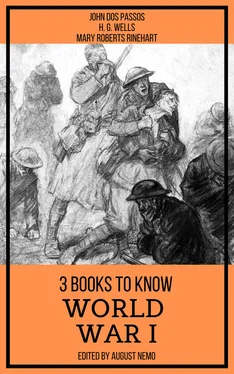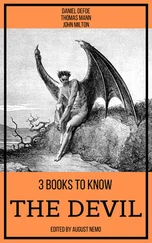––––––––
IT WAS SATURDAY MORNING. Directed by the corporal, a bandy-legged Italian who even on the army diet managed to keep a faint odour of garlic about him, three soldiers in blue denims were sweeping up the leaves in the street between the rows of barracks.
“You fellers are slow as molasses.... Inspection in twenty-five minutes,” he kept saying.
The soldiers raked on doggedly, paying no attention. “You don't give a damn. If we don't pass inspection, I get hell—not you. Please queeck. Here, you, pick up all those goddam cigarette butts.”
Andrews made a grimace and began collecting the little grey sordid ends of burnt-out cigarettes. As he leant over he found himself looking into the dark-brown eyes of the soldier who was working beside him. The eyes were contracted with anger and there was a flush under the tan of the boyish face.
“Ah didn't git in this here army to be ordered around by a goddam wop,” he muttered.
“Doesn't matter much who you're ordered around by, you're ordered around just the same,” said Andrews. “Where d'ye come from, buddy?”
“Oh, I come from New York. My folks are from Virginia,” said Andrews.
“Indiana's ma state. The tornado country.... Git to work; here's that bastard wop comin' around the buildin'.”
“Don't pick 'em up that-a-way; sweep 'em up,” shouted the corporal.
Andrews and the Indiana boy went round with a broom and a shovel collecting chewed-out quids of tobacco and cigar butts and stained bits of paper.
“What's your name? Mahn's Chrisfield. Folks all call me Chris.”
“Mine's Andrews, John Andrews.”
“Ma dad uster have a hired man named Andy. Took sick an' died last summer. How long d'ye reckon it'll be before us-guys git overseas?”
“God, I don't know.”
“Ah want to see that country over there.”
“You do?”
“Don't you?”
“You bet I do.”
“All right, what you fellers stand here for? Go and dump them garbage cans. Lively!” shouted the corporal waddling about importantly on his bandy legs. He kept looking down the row of barracks, muttering to himself, “Goddam.... Time fur inspectin' now, goddam. Won't never pass this time.”
His face froze suddenly into obsequious immobility. He brought his hand up to the brim of his hat. A group of officers strode past him into the nearest building.
John Andrews, coming back from emptying the garbage pails, went in the back door of his barracks.
“Attention!” came the cry from the other end. He made his neck and arms as rigid as possible.
Through the silent barracks came the hard clank of the heels of the officers inspecting.
A sallow face with hollow eyes and heavy square jaw came close to Andrews's eyes. He stared straight before him noting the few reddish hairs on the officer's Adam's apple and the new insignia on either side of his collar.
“Sergeant, who is this man?” came a voice from the sallow face.
“Don't know, sir; a new recruit, sir. Corporal Valori, who is this man?”
“The name's Andrews, sergeant,” said the Italian corporal with an obsequious whine in his voice.
The officer addressed Andrews directly, speaking fast and loud. “How long have you been in the army?”
“One week, sir.”
“Don't you know you have to be clean and shaved and ready for inspection every Saturday morning at nine?”
“I was cleaning the barracks, sir.”
“To teach you not to answer back when an officer addresses you....” The officer spaced his words carefully, lingering on them. As he spoke he glanced out of the corner of his eye at his superior and noticed the major was frowning. His tone changed ever so slightly. “If this ever occurs again you may be sure that disciplinary action will be taken.... Attention there!” At the other end of the barracks a man had moved. Again, amid absolute silence, could be heard the clanking of the officers' heels as the inspection continued.
“Now, fellows, all together,” cried the “Y” man who stood with his arms stretched wide in front of the movie screen. The piano started jingling and the roomful of crowded soldiers roared out:
“Hail, Hail, the gang's all here;
We're going to get the Kaiser,
We're going to get the Kaiser,
We're going to get the Kaiser,
Now!”
The rafters rang with their deep voices.
The “Y” man twisted his lean face into a facetious expression.
“Somebody tried to put one over on the 'Y' man and sing 'What the hell do we care?' But you do care, don't you, Buddy?” he shouted.
There was a little rattle of laughter.
“Now, once more,” said the “Y” man again, “and lots of guts in the get and lots of kill in the Kaiser. Now all together.... ”
The moving pictures had begun. John Andrews looked furtively about him, at the face of the Indiana boy beside him intent on the screen, at the tanned faces and the close-cropped heads that rose above the mass of khaki-covered bodies about him. Here and there a pair of eyes glinted in the white flickering light from the screen. Waves of laughter or of little exclamations passed over them. They were all so alike, they seemed at moments to be but one organism. This was what he had sought when he had enlisted, he said to himself. It was in this that he would take refuge from the horror of the world that had fallen upon him. He was sick of revolt, of thought, of carrying his individuality like a banner above the turmoil. This was much better, to let everything go, to stamp out his maddening desire for music, to humble himself into the mud of common slavery. He was still tingling with sudden anger from the officer's voice that morning: “Sergeant, who is this man?” The officer had stared in his face, as a man might stare at a piece of furniture.
“Ain't this some film?” Chrisfield turned to him with a smile that drove his anger away in a pleasant feeling of comradeship.
“The part that's comin's fine. I seen it before out in Frisco,” said the man on the other side of Andrews. “Gee, it makes ye hate the Huns.”
The man at the piano jingled elaborately in the intermission between the two parts of the movie.
The Indiana boy leaned in front of John Andrews, putting an arm round his shoulders, and talked to the other man.
“You from Frisco?”
“Yare.”
“That's goddam funny. You're from the Coast, this feller's from New York, an' Ah'm from ole Indiana, right in the middle.”
“What company you in?”
“Ah ain't yet. This feller an me's in Casuals.”
“That's a hell of a place.... Say, my name's Fuselli.”
“Mahn's Chrisfield.”
“Mine's Andrews.”
“How soon's it take a feller to git out o' this camp?”
“Dunno. Some guys says three weeks and some says six months.... Say, mebbe you'll get into our company. They transferred a lot of men out the other day, an' the corporal says they're going to give us rookies instead.”
“Goddam it, though, but Ah want to git overseas.”
“It's swell over there,” said Fuselli, “everything's awful pretty-like. Picturesque, they call it. And the people wears peasant costumes.... I had an uncle who used to tell me about it. He came from near Torino.”
“Where's that?”
“I dunno. He's an Eyetalian.”
“Say, how long does it take to git overseas?”
“Oh, a week or two,” said Andrews.
“As long as that?” But the movie had begun again, unfolding scenes of soldiers in spiked helmets marching into Belgian cities full of little milk carts drawn by dogs and old women in peasant costume. There were hisses and catcalls when a German flag was seen, and as the troops were pictured advancing, bayonetting the civilians in wide Dutch pants, the old women with starched caps, the soldiers packed into the stuffy Y. M. C. A. hut shouted oaths at them. Andrews felt blind hatred stirring like something that had a life of its own in the young men about him. He was lost in it, carried away in it, as in a stampede of wild cattle. The terror of it was like ferocious hands clutching his throat. He glanced at the faces round him. They were all intent and flushed, glinting with sweat in the heat of the room.
Читать дальше












